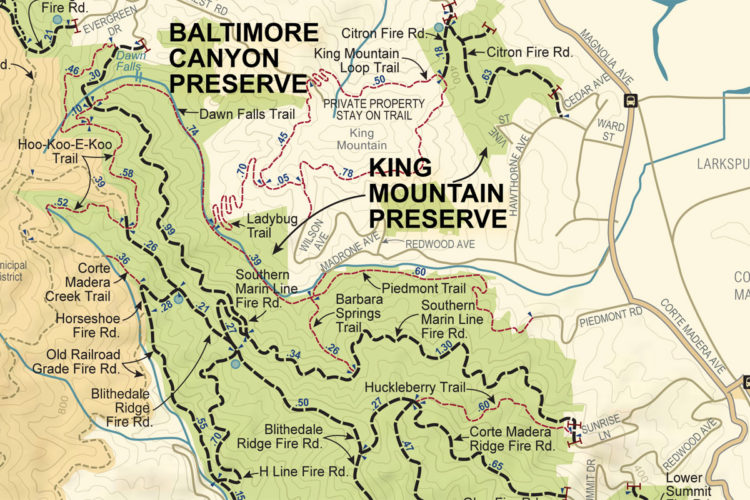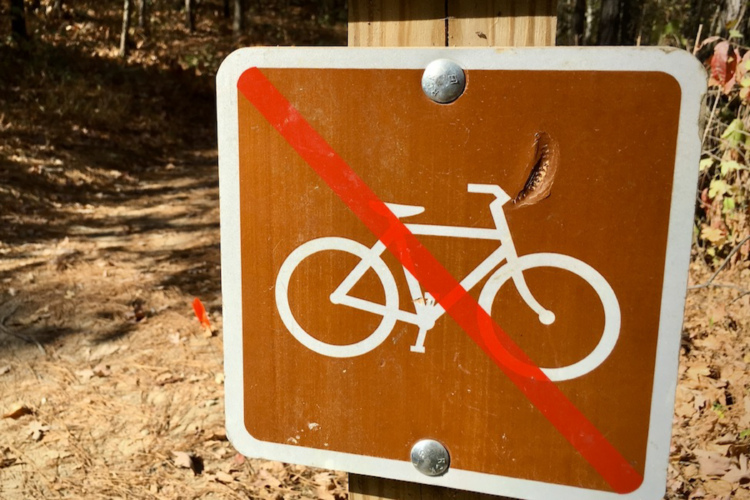
Just five years ago, if you told any Marin County, CA, bicycle advocate that there would be legal mountain bike access to actual trails on water district lands by the close of 2024, they’d have asked what you’re smoking. Following their invention on Marin County fire roads in the early 1970s*, mountain bikes have been banned on Mount Tamalpais trails since 1984.
Why? Change is hard. Hikers and equestrians were quite comfortable having these trails to themselves. Citing amorphous “environmental” and safety concerns, these well-organized constituencies attended the meetings, wrote their elected officials, and generally participated robustly in their democracy with the near-complete ban of bikes on trails as the result.
Organized resistance to this bicycle blackout began in the mid-1990s with groups like the Bicycle Trails Council of Marin, Access 4 Bikes, and the Marin County Bicycle Coalition all lending their respective shoulders to the wheel. Meanwhile, the mountain bike itself was evolving. Early brands like Gary Fisher and Breezer Bikes began appealing to broader audiences, bringing with them more members of the above organizations willing to donate money, time, letters, signatures, etc. — all of the things needed to make a movement.
Fast forward past a gazillion meetings, heated letters to editors, citations issued for the heinous crime of riding a bike on a trail, and here we are, fall of 2024, with an approved pilot program that includes 6.6 new bike-legal miles across 10 trails on Mt. Tam watershed lands, in addition to the allowance of class 1 e-bikes on those same trails and fire/maintenance roads.
The Marin County Bicycle Coalition (MCBC) and Access 4 Bikes (A4B) have been working toward this outcome for one and two decades respectively.
“MCBC is appreciative of all the work, outreach and collaboration done by Marin Water over the past several years. This is a huge win. We were prepared to get one or two trails and we got 10,” said Krista Hoff, MCBC’s Off-Road Director. “We are taking this opportunity seriously. We are conservationists too — we care about the ecology of Mt. Tam as well as other users’ experiences and we intend to be excellent trail stewards.”

Pilot program trails were selected after various lenses were applied, including: terrain difficulty, conflict and enforcement history, hazards, erosion risk, water quality, and the presence of rare plants. In order to facilitate mountain harmony in the face of proposed changes, the pilot program includes plans for new signage, biodiversity kiosks, and a new watershed map that is compatible with geolocation and will highlight the pilot trails. Several trails will be closed to equestrians, and one of the busiest trails will be recommended for weekday-only, uni-directional bike access.
Bill Keene, A4B Board Member and Director of Advocacy, said, “This is a great first step, and we are very pleased to be getting something for all of this effort. We expect the pilot to verify that these trails can be used and shared in a safe and environmentally friendly fashion.”
Keene added that cyclists are looking to get off of paved and service roads, for trail connectivity, and an expanded array of experiences, which A4B hopes will come in time.
“We make up 40% of the user base on the mountain. Now, with the pilot, we have less than 10% of the singletrack. But it’s a start.”
The e-bike pilot is set to start on October 1, 2024, and last for one year. The singletrack pilot will start at the same time and last for two years. During this time, the District will monitor trail use and infractions on nearby trails and conduct user, safety, and environmental surveys. Stepped up enforcement and increased fines on adjacent trails where bikes remain prohibited is causing consternation among a small percentage of riders who yearn for more advanced trails — riders who may have been comfortable with the former level of citation risk.
When asked if this increased enforcement meant that more rangers and/or sheriffs would be added to the payroll, Marin Water’s Communications & Public Affairs Manager Adriane Mertens said they would not: “We will not be adding new resources, just focusing the ones we have.”
The opening of these new trails is also a long-awaited boon to the multiple high school mountain bike teams in Marin who currently have an exceedingly limited number of trails on which to train for races.
While some of the trails that appear on the list for inclusion in the pilot program are smooth, double-wide tracks, others are “real” singletrack trails that are more challenging, and definitely backcountry (for a county located in the midst of the San Francisco Bay Area). It is important to note, however, that all of the proposed trails — be they single, double, or otherwise-track — are at the high end of the scenic beauty scale.
Matt Samson, Vice President of Marin Water’s Board of Directors, responded to safety issues repeatedly raised by equestrians and a small number of hikers, noting that safety is meant to be adaptively managed. Otherwise, he said, “if we just shut down everything that was quote-unquote unsafe, as a relative term…There would be a lot of interesting experiences that people do all day long on the mountain that we would have to yank back if we drove with a really strict safety component all the time,” according to an article in the Marin Independent Journal.
In other words, life’s dangerous. Hallelujah.
* Yes, yes, I know. So much to quibble with here. “Balloon tire bikes were being ridden off-road during the Triassic Period.” “Mountain bikes were ‘invented’ in Crested Butte, CO.” Okay. Heard. Now get back to the story, please.
Update October 9, 2024: “Marin mountain bikers’ celebratory Mt. Tam ride halted by 11th-hour lawsuit“





















3 Comments
Sep 18, 2024
Sep 16, 2024
Hopefully everyone will be on their best behavior during the trial so mountain bikers get permanent access to more trails on Mt. Tam.
Sep 17, 2024